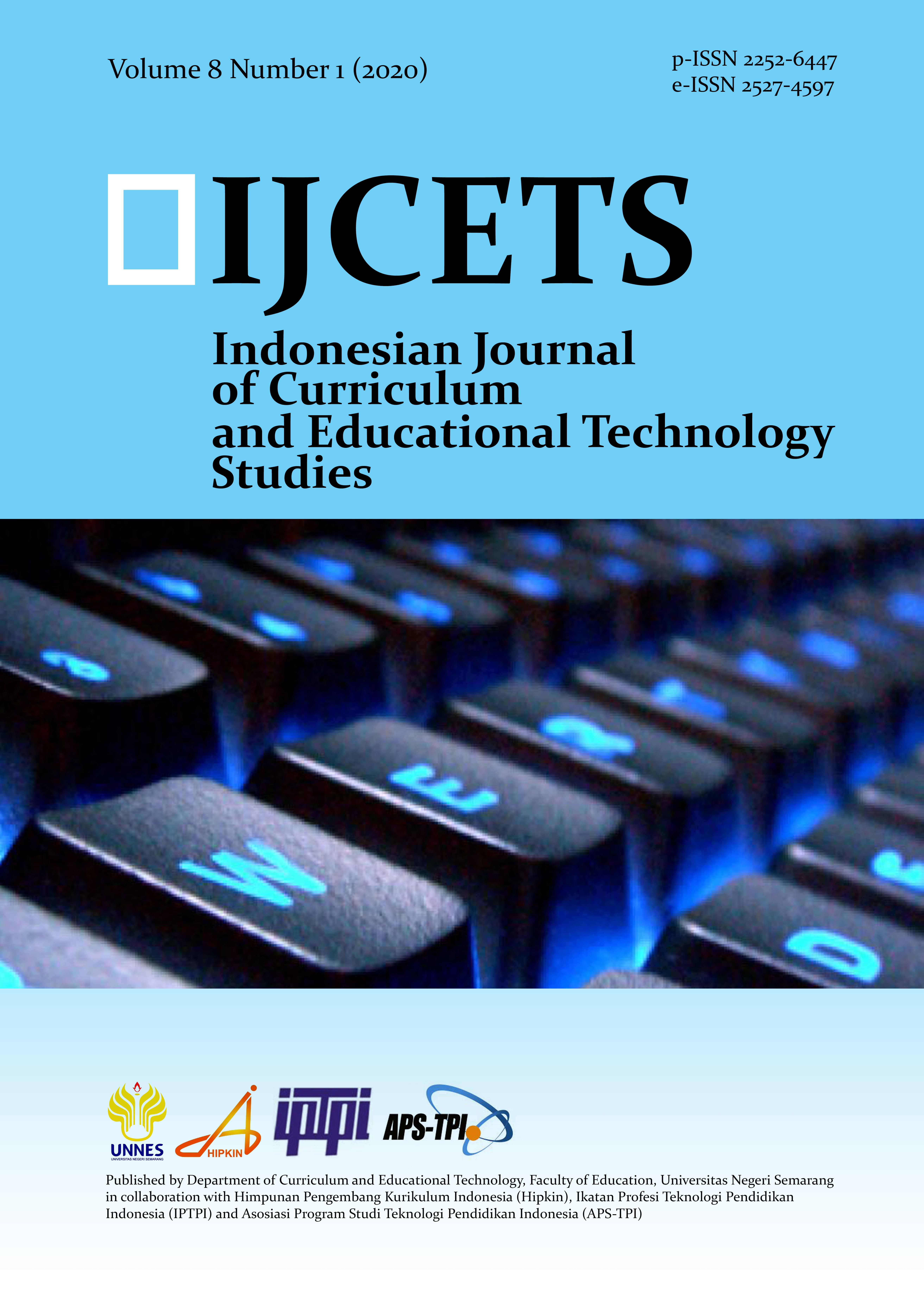Abstract
In many countries the development of curriculum always in relation to the politic and the intervention of the government. Furthermore, it brings complexities in practices when the teachers try to implement the national-official curriculum in schools’ context, because there are many tensions among the interest of the government, the teachers’ ability to perceive and develop the curriculum on a contextual way, the slow and conservative bureaucracy in the district level, and the empirical social phenomenon and changes in the field. For instance in Indonesia, the rise of the national curriculum of 2013 is not academic in nature, but more political and we could see how the government takes many issues from the international trend to enrich the content of the curriculum and it implementation (see i.e. Alhamuddin, 2019; Mitra & Purnawarman, 2019; Perdana, 2013).
The government role on developing the national curriculum is interesting, especially because it has a power and system to force the schooling system to accept and implement the official curriculum by enacting several policies. For me it is also interesting to questioning whether the government perceived the curriculum as a field of studies or only as a public policy? In Indonesian context this understanding is important, because could be the important cause of the stagnation of the development of Curriculum Studies in general (Subkhan, 2019). According to the this issue, the edited book by Priestly and Biesta (2013) is important, because it elucidates the recent development of curriculum policy and how it has been practiced and developed in many ways in many countries throughout the world. It is relevant to know the position and role of curriculum policy in the development of curriculum at national level and its affects to Curriculum Studies as well.
References
Pokok Merdeka Belajar Nadiem: USBN, UN, RPP, PPDB. (2019). Retrieved May 8, 2020, from Tekno.tempo.co website: https://tekno.tempo.co/read/1282813/4-pokok-merdeka-belajar-nadiem-usbn-un-rpp-ppdb
Ahmad, S. (2014). Problematika Kurikulum 2013 dan Kepemimpinan Instruksional Kepala Sekolah. Jurnal Pencerahan, 8(2), 98–108.
Alhamuddin. (2019). Politik Kebijakan Pengembangan Kurikulum di Indonesia sejak Zaman Kemerdekaan hingga Reformasi (1947-2013). Jakarta: Prenada Media Group.
Biesta, G., & Priestley, M. (2013). Capacities and Curriculum. In M. Priestley & G. Biesta (Eds.), Reinventing the Curriculum: New Trends in Curriculum Policy and Practice (pp. 35–49). London & New York: Bloomsbury.
Fanani, A., & Kusmaharti, D. (2018). Pengembangan Pembelajaran Berbasis HOTS (Higher Order Thinking Skill) di Sekolah Dasar Kelas V. JPD: Jurnal Pendidikan Dasar, 9(1), 1–11.
Humes, W. (2013). The Origins and Development of Curriculum for Excellence: Discourse, Politics and Control. In M. Priestley & G. Biesta (Eds.), Reinventing the Curriculum: New Trends in Curriculum Policy and Practice (pp. 13–34). London & New York: Bloomsbury.
Mengenal Konsep Merdeka Belajar dan Guru Penggerak. (2019). Retrieved May 8, 2020, from Direktorat Jenderal Guru dan Tenaga Kependidikan website: https://gtk.kemdikbud.go.id/read-news/mengenal-konsep-merdeka-belajar-dan-guru-penggerak
Menter, I., & Hulme, M. (2013). Developing the Teacher - or Not? In M. Priestley & G. Biesta (Eds.), Reinventing the Curriculum: New Trends in Curriculum Policy and Practice (pp. 165–186). London & New York: Bloomsbury.
Mitra, D., & Purnawarman, P. (2019). Teachers’ Perception Related to the Implementation of Curriculum 2013. Indonesian Journal of Curriculum and Educational Technology Studies, 7(1), 44–52. https://doi.org/10.15294/ijcets.v7i1.27564
Muthoharoh. (2017). Problem dan Solusi Implementasi Kurikulum 2013 Mata Pelajaran Pendidikan Agama Islam di MI Kota Semarang. Universitas Islam Negeri Walisongo.
Perdana, D. I. (2013). Kurikulum Dan Pendidikan Di Indonesia: Proses Mencari Arah Pendidikan Yang Ideal Di Indonesia Atau Hegemoni Kepentingan Penguasa Semata? Jurnal Pemikiran Sosiologi, 2(1), 63–74.
Pratiwi, U., & Fasha, E. F. (2015). Pengembangan Instrumen Penilaian HOTS berbasis Kurikulum 2013 terhadap Sikap Disiplin. Jurnal Penelitian Dan Pembelajaran IPA, 1(1), 123–142.
Priestley, M., Biesta, G., & Robinson, S. (2013). Teachers as Agents of Change: Teacher Agency and Emerging Models of Curriculum. In M. Priestley & G. Biesta (Eds.), Reinventing the Curriculum: New Trends in Curriculum Policy and Practice (pp. 187–206). London & New York: Bloomsbury.
Priestly, M., & Biesta, G. (Eds.). (2013). Reinventing the Curriculum: New Trends in Curriculum Policy and Practice. London, New Delhi, New York, & Sydney: Bloomsbury.
Reeves, J. (2013). The Successful Learner: A Progressive or an Oppressive Concept? In M. Priestley & G. Biesta (Eds.), Reinventing the Curriculum: New Trends in Curriculum Policy and Practice (pp. 51–73). London & New York: Bloomsbury.
Sinnema, C., & Aitken, G. (2013). Emerging International trends in Curriculum. In M. Priestley & G. Biesta (Eds.), Reinventing the Curriculum: New Trends in Curriculum Policy and Practice (pp. 141–163). London & New York: Bloomsbury.
Sofyatiningrum, E., Sisdiana, E., Astuti, R., Hariyanti, E., Efaria, L., Krisna, F. N., & Tola, B. (2018). Muatan HOTS pada Pembelajaran Kurikulum 2013 Pendidikan Dasar. Jakarta: Pusat Penelitian Kebijakan Pendidikan dan Kebudayaan, Badan Penelitian dan Pengembangan, Kementerian Pendidikan dan Kebudayaan.
Subkhan, E. (2018). Sosiologi Kurikulum Membuka Mata Mengenai Relasi Pengetahuan dan Kekuasaan. Indonesian Journal of Curriculum and Educational Technology Studies, 6(2), 116–120.
Subkhan, E. (2019). Does Indonesian Curriculum Studies Exist? International Journal of Innovation, Creativity and Change, 5(5), 406–420.

